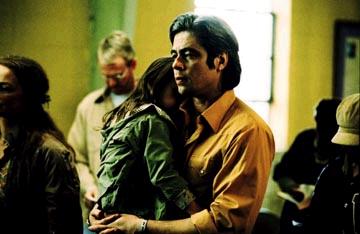

For his second full-length feature film, Mexican director Alejandro Gonzalez Inarritu decided to stick with a similar formula as his first film, Amores Perros, a critical and commercial success. This does not necessarily mean that he is just lazy or trying to milk his success. Instead, although there are many similarities, 21 Grams shows growth in Inarritu (11'09"01) as a director. Again, he examines the effects of a devastating car accident on different groups of people. The narrative does not unfold linearly, instead it jumps all over the place, going forwards and backwards in time, slowly revealing to the viewer what is going on and why.
Innaritu and screenwriter Guillermo Arriaga (Amores Perros) are primarily concerned with guilt and love, and how each emotion affects their three protagonists, Paul Rivers, Cristina Peck, and Jack Jordan. At the beginning, Innaritu and Arriaga throw out a succession of images that do not seem to make sense. Rivers (Penn, Mystic River, The Weight of Water) and Peck (Watts, Le Divorce, The Ring) are in bed together, naked. Jordan (Benicio Del Toro, The Hunted, The Pledge) looks like he is some sort of church counselor. Then they show him in jail, and Rivers is incapacitated in a hospital. The whole thing is disorienting, but never confusing. Innaritu structures it in a way such that people want to pay attention to learn how everything fits together. Astute viewers should be able to piece together the basic plot after about forty-five minutes, and then it's just a matter of seeing how things finally play out.
The title refers to the amount of weight a body supposedly loses upon death. One can say that this is actually the soul leaving the body, but the film never really delves into it. The plot is actually pretty simple when told in a straightforward manner, and worse, seems a little cliched, especially for Rivers. To his credit, Innaritu is able to overcome this by using the fractured nature of his story and by some compelling acting. Watts is the strongest, and gives a raw, searing performance of a woman trying to deal with profound loss. She has many emotions running around in her head, primarily rage and sadness, and has no clue how to handle them. When they surface, Watts explodes on screen. Innaritu favors shooting with handheld cameras, circling his actors, almost responding to their performances. The resolution is grainy, causing 21 Grams to feel somehow 'dirty.'
Penn was great in Mystic River, better than he was here, but they are different roles. Here, his character does not have the lightning rage hiding just beneath the surface. Rivers is a much more hesitant man, very unsure of himself and reluctant in his actions. His reactions are measured and motivated by a sense of responsibility. Del Toro is channeling a tremendous amount of regret. He has a temper that has gotten him in trouble in the past, and now must pay for his actions. It seems that no matter how much he tries to atone, his past always comes back to haunt him. The trio of performances serve as the backbone for the film. What makes the film notable is how Innaritu so thoroughly explores the emotions and emotion impact of this accident on his characters. He takes all three main characters and throws them out of their comfort zones, and then forces them to try to move on. It is unsettling, but extremely watchable.